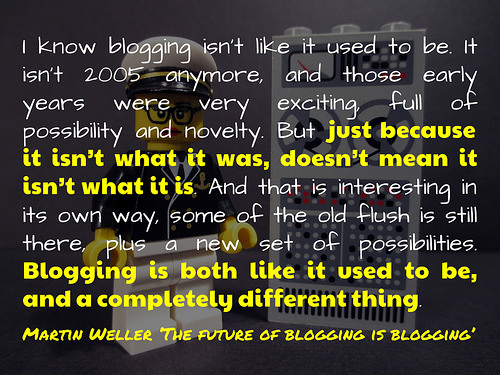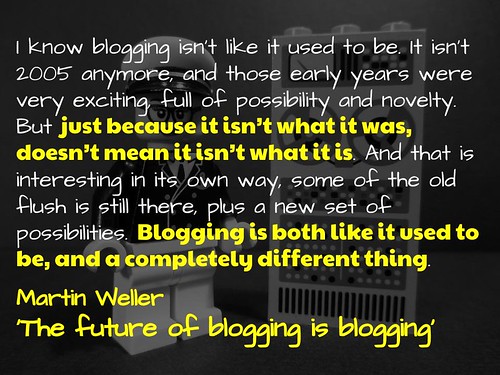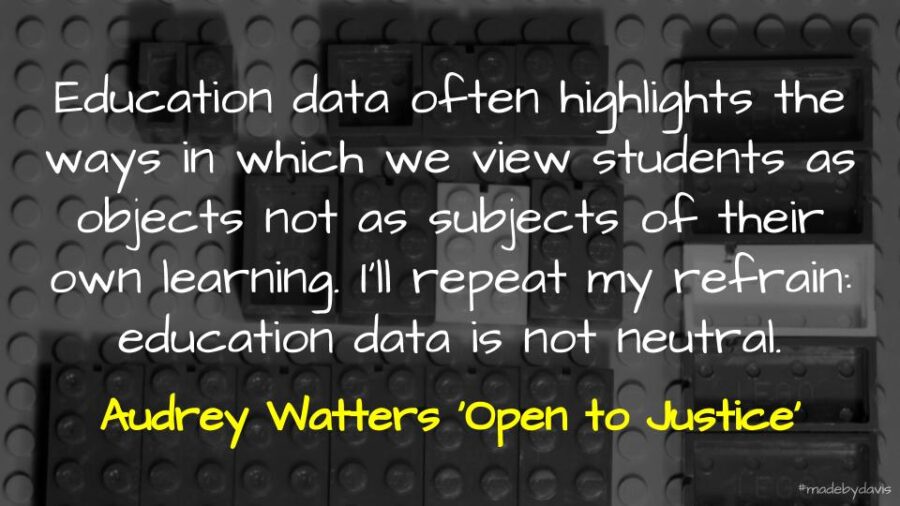I was reading Laura Hilliger’s recent missive in which she shared her experience of overhearing the hairdressers at the hair salon talking about going to a conference. For Laura, this experience was a reminder of all the things she has no idea about and how lifelong learning is about more than just picking up new skills:
Lifelong learning isn’t just about skill development, you know? It’s also about becoming aware to the world around you and pondering the implications of what you haven’t thought about before. There are so many thoughts you haven’t thought.
Source: FBT on Complacency and Conferences
This got me thinking about what it is I talk about when I talk about lifelong learning. Here then are some thoughts on the matter.
Reflecting on a life lived, Wouter Groeneveld recently wondered about the idea of developing a personal philosophy to live by?
Now you know why my hopes of reaching eighty diminish by the day. But it’s not too late to create my own philosophy. I’ve never felt a more urgent need to do something than this. I have been taking notes on how to live and how great philosophers before our time approach life in general, but in 2025, it is time to grab those notes and rework them into something of my own. Then I too can rest assured that the remainder of my life, all I have to do is to live up to my own set of rules.
Source: You Should Compile Your Own Philosophy by Wouter Groeneveld
I wonder about this, is such a pursuit an example of lifelong learning or life learning? I wonder if a personal philosophy is itself a lifelong pursuit, something continually devised. Ideas “held tightly, let go lightly?”
In Pierre Bayard’s exploration of reading and identity, he argues that we are the sum of the accumulated books we have read.
For we are more than simple shelters for our inner libraries; we are the sum of these accumulated books. Little by little, these books have made us who we are, and they cannot be separated from us without causing us suffering.
Source: How to Talk About Books You Haven’t Read by Pierre Bayard
However, I don’t believe this is some Matrix-style “I know kung fu”, where we know everything about books, or anything for that matters. We do not take in books as an objective entity, some things stand out, other parts are missed, others are forgotten over time.
Gert Biesta talks about the shift when it comes to lifelong learning to be about being ‘productive and employable’:
In about three decades, then, the discourse of lifelong learning seems to have shifted from ‘learning to be’ to ‘learning to be productive and employable’. Or, as Peter Jarvis has put it:
“The lifelong learning society has become part of the current economic and political discourse of global capitalism, which positions people as human resources to be developed through lifelong learning, or discarded and retrained if their job is redundant. (Jarvis, 2000, quoted in Grace, 2004, p. 398).”
The question this raises is how we should understand these developments and, more importantly, how we should evaluate them.
Source: Learning Democracy in School and Society: Education, Lifelong Learning, and the Politics of Citizenship by Gert J.J. Biesta
This focus on the economic comes at the expensive of personal fulfillment and democratic understanding.
Aspin and Chapman make a distinction between three of such purposes which, in their words, are: (1) lifelong learning for economic progress and development; (2) lifelong learning for personal development and fulfilment; and (3) lifelong learning for social inclusiveness and democratic understanding and activity (see Aspin and Chapman, 2001, pp. 3940).
Source: Learning Democracy in School and Society: Education, Lifelong Learning, and the Politics of Citizenship by Gert J.J. Biesta
Another consequence to the economic is the shift of responsibility to the individual.
Yet the point is not only that learning has become increasingly an individual activity. Under the influence of the learning economy learning has also increasingly become an individual issue and an individual responsibility (see, for example, Grace, 2004; Fejes, 2004). It is not only that under the imperatives of the learning economy only the economic function of lifelong learning seems to count as ‘good’ or desirable learning. There is also a clear tendency to shift the responsibility for learning to the individual or, at a larger scale, to shift this responsibility away from the state towards the private sector. In the learning economy learning ceases to be a collective good and increasingly becomes an individual good. In this scenario the state is less and less a provider and promoter of lifelong learning and increasingly becomes the regulator and auditor of the ‘learning market’ (see Biesta, 2004[a]).
Source: Learning Democracy in School and Society: Education, Lifelong Learning, and the Politics of Citizenship by Gert J.J. Biesta
This is fascinating to think about as the onus in the organisation I work in is for people to find their own professional development. Although there is money allocated, limited support or guidance is provided. What makes this even worse is that when you put in a request for professional development, you need to justify.
Reflecting upon lifelong learning and autodidacticism, Audrey Watters provides a series of questions to dig deeper:
what are the effects of an institution on an -ism?
Is autodidacticism about how you get to know something? Or is it about what you know? It is who you know? Is it how you know? (Or rather how you demonstrate knowing?)
Is autodidacticism an aptitude or an attitude? A behavior? A predilection? A performance?
Is autodidacticism a signal of learnedness?
Source: How Do Schools Affect Autodidacticism? by Audrey Watters
Thinking about this, maybe lifelong learning is actually people? This has me thinking about a post I wrote a few years ago wondering whether people not presentations make conferences and whether the power of a good PLN is the ability to bring in different ideas. I feel this is something I have lost with the changes in social media or maybe it reflects the changes in my work?
In the end, I wonder if the best lifelong learning is actually stopping and considering what it is we consider by lifelong learning? Learning about learning? Collecting and connecting the dots. To return to Laura’s point at the start, here is to more thoughts I haven’t thought.













